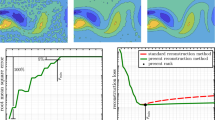Abstract
In this paper, we would suggest a sparse adaptive filtering technique which is robust against Gaussian and non-Gaussian noises. To this goal, a linear combination of the least mean square and the least mean fourth loss functions has been considered as the fidelity term. Moreover, in order to promote the sparsity property of the underlying vector, we have added different sparsity-inducing penalty terms. To optimize the resultant cost function, the quasi-Newton scheme has been adopted which accelerates the convergence of the algorithm. The convergence of the proposed method has been proved analytically. Furthermore, the efficiency of the suggested scheme has been evaluated through extensive simulation scenarios which confirm the superiority of the proposed algorithm over the other state-of-the-art schemes.











Similar content being viewed by others
References
A. Abtahi, M. Azghani, F. Marvasti, An adaptive iterative thresholding algorithm for distributed mimo radars. IEEE Trans. Aerosp. Electron. Syst. (2018). https://doi.org/10.1109/TAES.2018.2852400
M. Azghani, A. Ghorbani, F. Marvasti, Blind iterative nonlinear distortion compensation based on thresholding. IEEE Trans. Circuits Syst. II Express Briefs 64(7), 852–856 (2017)
M. Azghani, F. Marvasti, Sparse signal processing, in New Perspectives on Approximation and Sampling Theory (Springer, 2014), pp. 189–213
M. Azghani, F. Marvasti, L\(_2\)-regularized iterative weighted algorithm for inverse scattering. IEEE Trans. Antennas Propag. 64(6), 2293–2300 (2016). https://doi.org/10.1109/TAP.2016.2546385
B. Babadi, N. Kalouptsidis, V. Tarokh, Sparls: the sparse rls algorithm. IEEE Trans. Signal Process. 58(8), 4013–4025 (2010)
E.J. Candes, J.K. Romberg, T. Tao, Stable signal recovery from incomplete and inaccurate measurements. Commun. Pure Appl. Math. 59(8), 1207–1223 (2006)
S.H. Cho, S.D. Kim, K.Y. Jeon, Statistical convergence of the adaptive least mean fourth algorithm, in 3rd International Conference on Signal Processing, 1996, vol. 1 (IEEE, 1996), pp. 610–613
R.L. Das, M. Chakraborty, Improving the performance of the pnlms algorithm using l 1 norm regularization. IEEE/ACM Trans. Audio Speech Lang. Process. 24(7), 1280–1290 (2016)
D.L. Donoho, Compressed sensing. IEEE Trans. Inf. Theory 52(4), 1289–1306 (2006)
D.L. Duttweiler, Proportionate normalized least-mean-squares adaptation in echo cancelers. IEEE Trans. Speech Audio Process. 8(5), 508–518 (2000)
A.T. Georgiadis, B. Mulgrew, A family of recursive algorithms for channel identification in alpha-stable noise, in Fifth Bayona Workshop on Emerging Technologies in Telecommunications (1999), pp. 153–157
Y. Gu, J. Jin, S. Mei, \( l\_ \{0\}\) norm constraint lms algorithm for sparse system identification. IEEE Signal Process. Lett. 16(9), 774–777 (2009)
G. Gui, S. Kumagai, A. Mehbodniya, F. Adachi, Two are better than one: adaptive sparse system identification using affine combination of two sparse adaptive filters, in 2014 IEEE 79th Vehicular Technology Conference (VTC Spring) (IEEE, 2014), pp. 1–5
S.S. Haykin, Adaptive Filter Theory (Pearson Education, Noida, 2008)
C.H. Lee, B.D. Rao, H. Garudadri, Sparsity promoting lms for adaptive feedback cancellation, in 2017 25th European Signal Processing Conference (EUSIPCO) (IEEE, 2017), pp. 226–230
Y. Li, Z. Jin, Y. Wang, R. Yang, A robust sparse adaptive filtering algorithm with a correntropy induced metric constraint for broadband multi-path channel estimation. Entropy 18, 380 (2016). https://doi.org/10.3390/e18100380
Y. Li, Y. Wang, F. Albu, Sparse channel estimation based on a reweighted least-mean mixed-norm adaptive filter algorithm, in 24th European Signal Processing Conference (EUSIPCO), 2016 (IEEE, 2016), pp. 2380–2384
H. Yazdanpanah, J.A. Apolinário, P.S.R. Diniz, M.V.S. Lima, l0-NORM FEATURE LMS ALGORITHMS. in 2018 IEEE Global Conference on Signal and Information Processing (GlobalSIP) (Anaheim, CA, USA, 2018), pp. 311–315. https://doi.org/10.1109/GlobalSIP.2018.8646465
M.V. Lima, T.N. Ferreira, W.A. Martins, M.O. Mendonça, P.S. Diniz, Performance evaluation of adaptive filters for sparse wireless channel estimation, in 2017 25th European Signal Processing Conference (EUSIPCO) (IEEE, 2017), pp. 2601–2065
W. Ma, H. Qu, J. Zhao, B. Chen, J.C. Principe, Sparsity aware minimum error entropy algorithms, in 2015 IEEE International Conference on Acoustics, Speech and Signal Processing (ICASSP) (IEEE, 2015), pp. 2179–2183
U.B. Mansoor, Q. Mayyala, M. Moinuddin, A. Zerguine, Quasi-Newton least-mean fourth adaptive algorithm, in 25th European Signal Processing Conference (EUSIPCO), 2017 (IEEE, 2017), pp. 2639–2643
K.B. Petersen, M.S. Pedersen et al., The matrix cookbook. Tech. Univ. Den. 7(15), 510 (2008)
A.H. Sayed, Fundamentals of Adaptive Filtering (Wiley, London, 2003)
M. Shao, C.L. Nikias, Signal processing with fractional lower order moments: stable processes and their applications. Proc. IEEE 81(7), 986–1010 (1993)
J. Wang, E.E. Kuruoglu, T. Zhou, Alpha-stable channel capacity. IEEE Commun. Lett. 15(10), 1107–1109 (2011)
Z. Yang, Y.R. Zheng, S.L. Grant, Proportionate affine projection sign algorithms for sparse system identification in impulsive interference, in 2011 IEEE International Conference on Acoustics, Speech and Signal Processing (ICASSP) (IEEE, 2011), pp. 4068–4071
J. Yao, W. Deng, Z. Jiao, Rise-based adaptive control of hydraulic systems with asymptotic tracking. IEEE Trans. Autom. Sci. Eng. 14(3), 1524–1531 (2015)
J. Yao, Z. Jiao, D. Ma, L. Yan, High-accuracy tracking control of hydraulic rotary actuators with modeling uncertainties. IEEE/ASME Trans. Mechatron. 19(2), 633–641 (2013)
Y. Yin, J. Liu, W. Luo, L. Wu, S. Vazquez, J.I. Leon, L.G. Franquelo, Adaptive control for three-phase power converters with disturbance rejection performance. IEEE Trans. Syst. Man Cybern. Syst. (2018). https://doi.org/10.1109/TSMC.2018.2876322
J. Yoo, J. Shin, P. Park, An improved nlms algorithm in sparse systems against noisy input signals. IEEE Trans. Circuits Syst. II Express Briefs 62(3), 271–275 (2015)
Author information
Authors and Affiliations
Corresponding author
Additional information
Publisher's Note
Springer Nature remains neutral with regard to jurisdictional claims in published maps and institutional affiliations.
Rights and permissions
About this article
Cite this article
Maleki, N., Azghani, M. Sparse Mixed Norm Adaptive Filtering Technique. Circuits Syst Signal Process 39, 5758–5775 (2020). https://doi.org/10.1007/s00034-020-01432-8
Received:
Revised:
Accepted:
Published:
Issue Date:
DOI: https://doi.org/10.1007/s00034-020-01432-8




